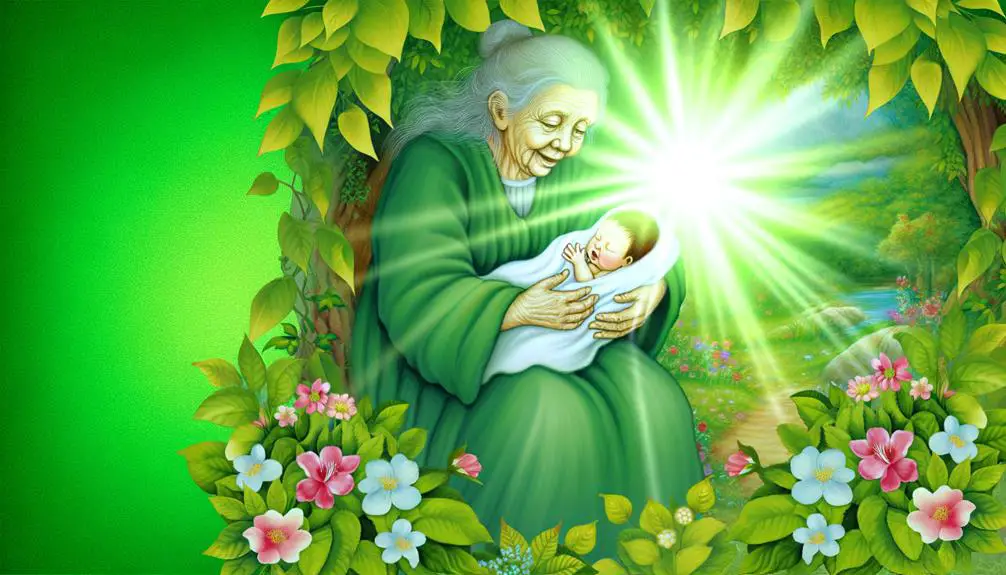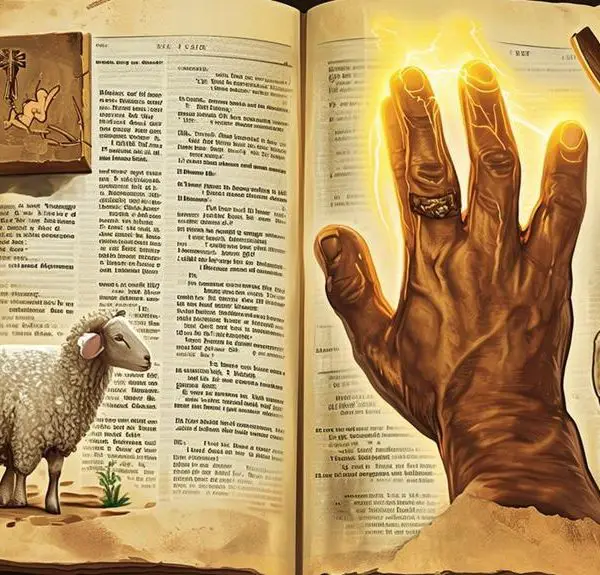Immerse yourself in the miraculous story of Elizabeth, whose faith defied age and barrenness, hinting at a greater divine plan.

Elizabeth in the Bible Story
Elizabeth in your search is a biblical figure of significant stature, rooted deeply in Aaron's priestly lineage. Her life story, marked by piety and adherence to Mosaic Law, unfolds through divine prophecies and miraculous events. When you explore Elizabeth's narrative, you encounter the pivotal moment of Gabriel's revelation to Zechariah, her husband, foretelling the birth of John the Baptist. Despite her initial barrenness, Elizabeth's steadfast faith is rewarded with a miraculous pregnancy, symbolizing the transformative power of belief. Her interactions with Mary underscore a profound recognition of the Messiah, reinforcing themes of divine intervention and prophetic fulfillment. The intricate details of her story reveal layers of theological and cultural insights, beckoning further exploration into her lasting impact on faith and prophecy.
Key Takeaways
- Elizabeth, a descendant of Aaron, was a righteous woman who adhered to Mosaic Law.
- She experienced a miraculous pregnancy in her old age as a reward for her faith.
- The angel Gabriel announced to her husband Zechariah that they would have a son, John the Baptist.
- Elizabeth recognized Mary's unborn child as the Messiah during Mary's visitation.
- Her story exemplifies themes of faith, patience, and divine intervention in the Bible.
Elizabeth's Lineage and Background

Elizabeth, a descendant of Aaron, was deeply rooted in a priestly heritage, which profoundly influenced her faith and role within the biblical narrative. This lineage isn't merely a genealogical footnote; it is pivotal in understanding how Elizabeth's background shaped her character and actions. As you explore her family origins, it's vital to recognize that being part of Aaron's line meant that Elizabeth was raised in an environment steeped in religious traditions and obligations. This heritage imbued her with a strong sense of duty and piety, which are evident throughout her life story.
The religious influences that permeated her upbringing were not just familial but also communal. As part of a community that valued and adhered strictly to the precepts of the Mosaic Law, Elizabeth's day-to-day life would have been deeply entrenched in the practices and rituals of her faith. This context is essential for understanding her receptiveness to divine interventions in her life, such as her miraculous pregnancy. Her background provided her with a framework of faith that supported her during the trials and triumphs she faced, making her a key figure in the biblical narrative not only by relation but also by her faith and actions.
Zechariah's Vision From Gabriel
Building on Elizabeth's deep religious roots, her husband Zechariah's encounter with the angel Gabriel marks a pivotal moment in their lives, profoundly reflecting the intersection of personal faith and divine intervention. This narrative, rich in prophetic messages and angelic roles, unfolds in the secluded space of the temple where Zechariah, a devout priest, performs his duties. Gabriel's appearance isn't merely a visitation but a profound communication from the divine, aimed at bridging human understanding with God's plans.
As you explore further, you'll see that Gabriel's role transcends the bearer of news; he functions as a mediator of God's will, revealing the forthcoming birth of John the Baptist, who is destined to prepare the way for Jesus. This revelation is not just informative but transformative. It challenges Zechariah's perception and tests his faith, particularly through the imposition of muteness due to his initial disbelief.
Analyzing this encounter, it's evident that the angelic intervention serves multiple layers of purpose: confirming the continuity of God's work through generations, highlighting the miraculous amidst the ordinary, and underscoring the weight of prophetic messages which often come wrapped in challenges. This episode in Zechariah's life enriches our understanding of how divine messages are intricately woven into the fabric of human experiences.
The Miracle of Elizabeth's Pregnancy

Following Zechariah's divine encounter, the subsequent miracle of Elizabeth's conception strikingly alters their narrative, illustrating a tangible manifestation of faith rewarded and prophecy fulfilled. This event, marked by divine intervention, underscores the transformative power of belief and obedience in the face of improbability. Elizabeth, who was advanced in years and barren, experienced unexpected joy through this miraculous conception, reflecting a profound theme of hope and divine benevolence in biblical stories.
Your understanding of this miracle should consider the cultural and theological context of Elizabeth's time. In ancient Jewish society, barrenness was often viewed with social and spiritual disappointment, sometimes perceived as a sign of divine disfavor. Elizabeth's conception, hence, not only reverses this stigma but also sets the stage for the birth of John the Baptist, who plays an essential role in the New Covenant as the forerunner of Jesus.
The narrative technique used here, where an angel predicts the pregnancy, serves as a literary and theological anchor, connecting the Old Testament prophecies with the New Covenant's fulfillment. This intersection of human condition and divine intervention invites you to ponder the deeper implications of faith, promise, and the unexpected ways in which joy can manifest, even in the most unlikely circumstances.
Mary Visits Elizabeth
After learning of her own miraculous pregnancy, Mary journeys to visit her relative Elizabeth, further intertwining their narratives of divine favor and prophetic fulfillment. This visit not only symbolizes a familial connection but also an important prophetic interaction marked by mutual recognition of each other's significant role in the unfolding biblical narrative.
The journey details of Mary's trip to Elizabeth are sparse but meaningful, emphasizing the urgency and importance of this familial connection. Upon arrival, the moment is ripe with familial joy, as both women, divinely chosen, share their experiences and the incredible circumstances of their pregnancies.
Here are some pivotal aspects that make this visit significant:
- Immediate Recognition: Elizabeth, filled with the Holy Spirit, recognizes Mary's baby as the Messiah instantly.
- Spiritual Confirmation: Elizabeth's baby leaps in her womb, signaling divine recognition and joy.
- Prophetic Utterance: Elizabeth's exclamation blesses Mary among women, highlighting the significance of Mary's role.
- Mutual Support: This visit provides emotional and spiritual support, reinforcing their shared destiny.
- Cultural Context: The visit reflects deep cultural values of kinship and mutual care in times of significant life changes.
This encounter, rich in spiritual and familial implications, sets the stage for further prophetic events, emphasizing the intertwined destinies of both women and their roles in biblical salvation history.
The Birth and Naming of John
Continuing the divine narrative, Elizabeth gave birth to a son, who was named John, fulfilling the angel Gabriel's prophecy precisely. This event not only marked a significant moment in biblical history but also underscored the deep-rooted cultural customs surrounding childbirth and naming in ancient Jewish society. Typically, newborns were named on the eighth day at the time of their circumcision, a practice that intertwined religious duty with communal identity. In John's case, his naming broke conventional norms, as the name 'John' was not a family name, thereby surprising those present.
The choice of John's name carries profound significance. In Hebrew, John, or Yohanan, means 'Yahweh has been gracious.' This name reflects not just a personal identifier but a theological affirmation, emphasizing God's grace in fulfilling His promises. By deviating from traditional familial names, this act highlighted the unique role John was destined to play in salvation history, as the forerunner to the Messiah, Jesus Christ.
Here, you see how deeply intertwined cultural customs and theological beliefs were in shaping the events of the biblical narrative. The naming of John serves not merely as an act of parental authority but as a manifestation of divine intervention and purpose in human history.
Elizabeth's Legacy and Influence
As you explore Elizabeth's legacy within biblical narratives, it's essential to recognize her spiritual strength as a cornerstone of her enduring influence. By examining how she guided future generations, you'll notice the strategic roles women play in religious texts. Her embodiment as a symbol of faithfulness offers a profound insight into the socio-religious fabric of her time, highlighting her impact on both contemporary and later theological interpretations.
Elizabeth's Spiritual Strength
Elizabeth's spiritual strength profoundly influenced her community and shaped her enduring legacy in biblical narratives. As you explore her story, you'll find that her devotion and faith were not only personal but also had a profound impact on those around her.
- Prayer Life: Her constant communication with God set a spiritual standard in her community.
- Community Role: Elizabeth served as a spiritual mentor, fostering faith and devotion among her peers.
- Model of Patience: Her long wait for a child exemplified steadfast faith.
- Bearer of Blessings: She recognized and proclaimed the future significance of Mary and Jesus.
- Source of Inspiration: Her story encourages generations to trust in God's timing and plan.
Her spiritual legacy continues to resonate through these powerful aspects of her life.
Guiding Future Generations
Through her spiritual legacy, Elizabeth has guided generations, teaching them the virtues of faithfulness and patience. Her story serves as a cornerstone for cultural transmission and ethical education, emphasizing the importance of steadfastness and spiritual endurance to you and future generations. Elizabeth's example extends beyond mere narrative; it's woven into the fabric of cultural ethics, offering a blueprint for personal development and community enrichment.
Aspect |
Description |
Impact on Society |
|---|---|---|
Faithfulness |
Elizabeth's unwavering faith |
Encourages steadfast values |
Patience |
Long wait for her child |
Teaches the virtue of patience |
Guidance |
Mentorship of Mary |
Fosters ethical education |
This structured approach to her legacy highlights how pivotal figures can influence societal values and personal ethics.
Symbol of Faithfulness
Her unwavering commitment to faith profoundly shapes how generations perceive and uphold spiritual and moral values. Elizabeth's steadfast devotion and adherence to divine roles offer a rich template for understanding the nuances of faithfulness in biblical narratives. Analyzing her legacy, you'll find that her influence is multifaceted:
- Role modeling: Demonstrating piety and patience.
- Prophetic fulfillment: Embodying the promises spoken by prophets.
- Intercessory prayer: Advocating through prayer.
- Community impact: Strengthening faith communities.
- Mentorship: Guiding younger generations like Mary.
Through these lenses, Elizabeth's story isn't just historical; it's a continuous lesson in spiritual endurance and moral fortitude, inspiring you to reflect on how deep faith can shape your own life and the lives around you.
Frequently Asked Questions
How Old Was Elizabeth When She Became Pregnant?
You're examining the miraculous timing of a woman's pregnancy at a biblical age, a rare occurrence indeed. Traditionally, such ages are not specified, underscoring the exceptional nature of these ancient narratives.
Did Elizabeth Have Any Other Children Besides John?
You're exploring whether Elizabeth had other children besides John. Analyzing her familial lineage and the miraculous conception, no records suggest any siblings for John, indicating he was likely her only child.
What Was Elizabeth's Daily Life Like?
Elizabeth's daily life, like a well-tuned orchestra, revolved around religious duties and meticulous household management. You'd find her balancing spiritual commitments with the pragmatics of running a home, each task executed with precision.
How Did Elizabeth's Community React to Her Pregnancy?
Your community would likely react with astonishment to such a pregnancy, viewing it as a result of divine intervention, prompting a detailed analysis of societal norms and the interpretation of miraculous events.
What Were Elizabeth's Hobbies or Interests?
You'd find Elizabeth, like many historical figures, likely engaged deeply in religious devotion. Her interests probably extended to fulfilling family roles, reflecting societal expectations and personal faith commitments in a detailed, scholarly analysis.



Sign up